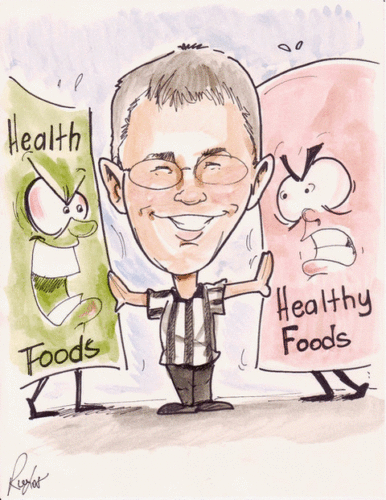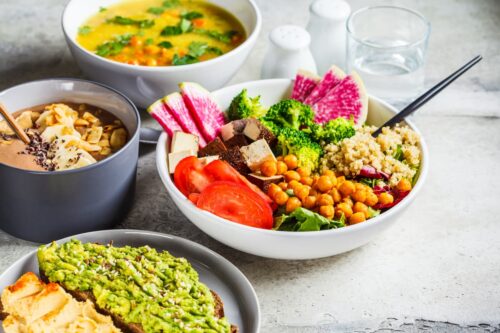The Ultimate Heart Disease Diet Plan
Updated September 9, 2023

Heart disease is the leading cause of death for Americans. In fact, a person dies every 33 seconds from heart disease—and someone has a heart attack every 40 seconds.
With the standard American diet (SAD) being so prevalent, this problem is only going to get worse. This is truly a tragedy, as changing to a tasty heart disease diet is easy if you focus on plant-based foods.
Your heart is the center of everything. It’s what pumps blood, oxygen and nutrients throughout your entire body. It also gets rid of the carbon dioxide your body produces.
When you develop heart disease, also known as cardiovascular disease (CVD), blood flow begins to constrict. This is because plaque has built up in or around the arteries that your blood flows through. When the blood can’t flow, oxygen can’t get to your heart—which is what causes chest pain. It also means other parts of your body aren’t receiving sufficient oxygen either.
This leads to:
- Arrhythmia (heart rhythm being off-beat)
- Dizziness
- Fainting
- Fatigue
- Pain in the chest, back and/or shoulders
- Shortness of breath
- Swelling in legs and feet
Heart disease also puts you at a higher risk of developing:
- Depression
- Diabetes
- High blood pressure
- Kidney problems
- Obesity
- Stroke
Eventually, plaque can break off and block an artery which then causes a heart attack. Common signs of a heart attack include:
- Cold sweat
- Dizziness
- Lightheadedness
- Nausea
- Pain in the upper body (shoulders, neck, back, etc.)
- Pain or pressure/squeezing in the center or left side of the chest
- Shortness of breath
- Trouble breathing
- Unusual fatigue
- Vomiting
It’s difficult to recover from a heart attack, and it can take a long time to go back to the way you were living before. So instead of worrying about when you’re going to have a heart attack, help prevent one from happening by eating the right diet.
How Your Diet Heals—or Harms—Your Heart
Your diet impacts every aspect of your body, including your heart. Greasy, fat-filled, sugary processed foods create the plaque that constricts your arteries, reducing blood flow to the heart and causing the problems listed above.
Meanwhile, eating a healthy plant-based diet has been proven to improve heart health. A study found that those who ate a plant-based diet reduced the risks of cardiovascular death by 8.1%, and reduced the risk of developing heart disease by 10.2%. This is due to a higher intake of fiber, plant protein, antioxidants, and unsaturated fatty acids.
Also, the anti-inflammatory properties of plant-based foods have been shown to have cardioprotective properties.
Additionally, a different study showed how meat-based diets can affect your heart. The study compared people who consume a plant-based diet versus an animal-based diet. Compared to animal-based eaters, plant-based eaters had:
- 16% lower risk of having heart attacks, stroke and heart failure
- 32% lower risk of dying from a cardiovascular disease
- 25% lower risk of dying from any cause compared to those who ate the least amount of plant-based foods
Tasty Recipes for Heart Disease Prevention and Management
Now that you understand the importance of a healthy diet, it’s time to make it part of your everyday life. Whether you’re looking for a heart-healthy or post-heart attack diet, the delicious recipes listed below will help make your health journey a little easier (and more enjoyable).
Breakfast Recipes
Start off the day on a positive note with these breakfast recipes:
- Baked French Toast
- Baked Oatmeal with Apples and Raisins
- Breakfast Apple Rice
- Breakfast Bowls
- Breakfast Burritos
- Cinnamon Crunch Granola
- Fantastic Overnight Cereal
- Fluffy Pancakes
- Fruit and Oat Breakfast Bars
- Potato Hash
- Quick Steel-Cut Oats with Blueberry Topping
- Spinach Frittata
- Sunshine Fruit Salad
- Veggie Benedicts
- Waffles
Lunch/Dinner Recipes
Don’t worry about what’s for lunch or dinner with these recipes:
- African Yam Stew
- Asian Marinated Tofu
- Asparagus and Pea Salad
- Baked Mexican Pasta
- Baked Potato Skins
- BBK Soup
- Bean and Corn Enchiladas
- Beetroot Hummus Veggie Wraps
- Black Bean Chili
- Black Beans and Tomatoes
- Caramelized Onion and Pepper Quesadillas
- Carrot Loaf
- Cauliflower Cocktail
- Cheezy Baked Macaroni
- Chicago Diner Burger
- Confetti Rice Salad
- Curried Eggplant
- Deviled Beans and Greens
- Fresh Tomato Gazpacho
- Garden Vegetable Stew
- Hummus Wraps
- Lemon-Ginger Sweet Root Noodles
- McVeggie Burgers
- Peanutty Tofu Lettuce Cups
- Potato and Kale Soup
- Sparkling Jewel Salad
- Spinach, Fennel and Mango Salad
- Sweet Potato Tacos
- Texas Barbecue Wrap
- Yukon Stuffed Peppers
- Zucchini Corn Salad
Snack
If you’re hungry between meals, these are delicious (and healthy) snacks:
- Baked Potatoes
- Baked Yams
- Baked Kale Chips
- Baked Steak Fries
- Caramelized Onions
- Chubby Chips
- Mediterranean Mushrooms
- Tiffany’s Candied Walnuts
- Tortilla Chips
Dessert Recipes
For those who have a sweet tooth but still want to protect their heart, here are the recipes for you:
- Apple Crisp
- Banana Blueberry Bars
- Berry Sorbet
- Persimmon Bars
- Pumpkin Pie
- The World’s Healthiest Apple Pie
Dr. McDougall’s Heart Disease Diet Plan & Grocery List
A heart-healthy diet uses whole grains, vegetables, fruit, and legumes while consuming less meat and fewer processed foods. To make getting into the habit of healthy eating easier, we’ve created a heart disease diet plan for two weeks and a grocery list to follow.
2-Week Heart-Friendly Diet Plan
| Week 1 | Monday | Tuesday | Wednesday | Thursday | Friday | Saturday | Sunday |
| Breakfast | Sunshine Fruit Salad | Waffles | Baked Oatmeal with Apples and Raisins | Fruit and Oat Breakfast Bars | Breakfast Burritos | Fantastic Overnight Cereal | Potato Hash |
| Lunch | Chicago Diner Burger | Fresh Tomato Gazpacho | Black Bean Chili | Spinach, Fennel and Mango Salad | Deviled Beans and Greens | Peanutty Tofu Lettuce Cups | Texas Barbecue Wrap |
| Dinner | African Yam Stew | Confetti Rice Salad | Hummus Wraps | Carrot Loaf | Yukon Stuffed Peppers | Sweet Potato Tacos | Lemon-Ginger Sweet Root Noodles |
| Snack | Baked Potatoes | Baked Kale Chips | Tortilla Chips | Tiffany’s Candied Walnuts | Mediterranean Mushrooms | Baked Yams | Caramelized Onions |
| Dessert | Berry Sorbet | Banana Blueberry Bars | Persimmon Bars | Pumpkin Pie | Apple Crisp | The World’s Healthiest Apple Pie | Pumpkin Pie |
| Week 2 | Monday | Tuesday | Wednesday | Thursday | Friday | Saturday | Sunday |
| Breakfast | Cinnamon Crunch Granola | Breakfast Bowls | Spinach Frittata | Quick Steel-Cut Oats with Blueberry Topping | Baked French Toast | Veggie Benedicts | Fluffy Pancakes |
| Lunch | Bean and Corn Enchiladas | Baked Mexican Pasta | McVeggie Burgers | Garden Vegetable Stew | Black Beans and Tomatoes | Cheezy Baked Macaroni | Zucchini Corn Salad |
| Dinner | Asparagus and Pea Salad | Curried Eggplant | Sparkling Jewel Salad | Beetroot Hummus Veggie Wraps | Sloppy Lentil Joes | Cauliflower Cocktail | Asian Marinated Tofu |
| Snack | Chubby Chips | Baked Potatoes | Mediterranean Mushrooms | Baked Kale Chips | Baked Steak Fries | Caramelized Onions | Tortilla Chips |
| Dessert | The World’s Healthiest Apple Pie | Berry Sorbet | Persimmon Bars | The World’s Healthiest Apple Pie | Banana Blueberry Bars | Pumpkin Pie | Apple Crisp |
Heart-Friendly Grocery List
Separated into different categories, below is your heart disease diet shopping list for your next grocery shopping trip.
Fruit
Here’s a list of heart-friendly fruit:
- Apples
- Avocados
- Bananas
- Blueberries
- Cherries
- Grapefruit
- Grapes
- Kiwi
- Lemons
- Limes
- Melon
- Oranges
- Peaches
- Pears
- Plums
- Raspberries
- Strawberries
Veggies
One study showed that vegetables carry tremendous potential for preventing and treating heart disease through their vitamins, minerals, fibers, and protein.
- Arugula
- Asparagus
- Beets
- Broccoli
- Cabbage
- Carrots
- Cauliflower
- Celery
- Corn
- Cucumbers
- Edamame
- Kale
- Lettuce
- Onions
- Peppers
- Potatoes
- Spinach
- Squash
- Sweet potatoes
- Tomatoes
- Zucchini
Whole Grains
It’s been shown that eating more whole grain is tied to a lower risk of heart disease:
- Barley
- Brown rice
- Cornmeal
- Millet
- Oats
- Popcorn
- Quinoa
- Whole-grain bread
- Whole-grain flour
- Whole-grain pasta
Nuts/Seeds
Nuts and seeds can be a healthy part of your diet. But remember, if weight loss is one of your goals, keep them to a minimum (at least until you reach your ideal weight):
- Almonds
- Cashews
- Chia seeds
- Flaxseeds
- Hazelnuts
- Macadamias
- Sunflower seeds
- Peanuts
- Pecans
- Pumpkin seeds
- Walnuts
Legumes
Add more legumes to your diet, as one study showed they can reduce the risk of heart disease:
- Adzuki beans
- Black beans
- Chickpeas (garbanzo beans)
- Fava beans
- Kidney beans
- Lentils
- Lima beans
- Pinto beans
- Soybeans
- Tofu
- White beans
Star McDougall Story: Lyndall Shick
Lyndall Shick is one of many McDougall success stories. Her family history of heart disease haunted her. By age 11, she had lost six family members to heart disease. At 41, she had her first heart attack, which was particularly upsetting due to being the same age as her father when he passed away from his third stroke.
After an angiogram (x-ray of the heart) and angioplasty (surgery to stretch out the arteries), she was given the American Heart Association (AHA) diet guidelines, a bunch of pills, and sent on her way.
Lynda struggled to keep up with the AHA diet; she would do her best, and then slip back into bad habits (as we all do). Eventually, her health started to fail. Between 1992 and 2004, she had nine surgeries and procedures.
In 2013, she started having chest pain, eventually leading to a trip to the ER, and a fresh angiogram showed she needed coronary bypass surgery. Despite being unsure, she went through with it, although it didn’t really help her…so she found a new solution: A whole food plant-based diet.
Through this research, she came across the McDougall Program.
Since 2013 she’s been able to follow the program and finds it easier to follow. As she says, “I eat all I want, and surprise people by the sheer volume of food I consume! I’m no longer afraid of carbs, and home, not restaurants, is the best place to eat.”
Her cholesterol is the best it’s been, her blood pressure is no longer a concern, her depression is better and she has more energy thanks to the McDougall Program!
Take Care of Your Heart
Improving your diet is the most effective way to care for your heart without completely uprooting your life and finances. We understand it’s a huge step to completely change your food consumption, which is why we’re here to help.
If our heart disease diet meal guide isn’t enough guidance by itself, simply join The McDougall Program. The 12-day program is run by nutrition expert and physician Dr. John McDougall and his team. It’s 100% online, and you’ll receive direct access to a dedicated support specialist for an entire year.
Join The McDougall Program today!
Recommended Articles

The 10 Most Healthful Packaged Foods

Plant-Based Diet for Mental Health: Nourishing Your Body and Mind






